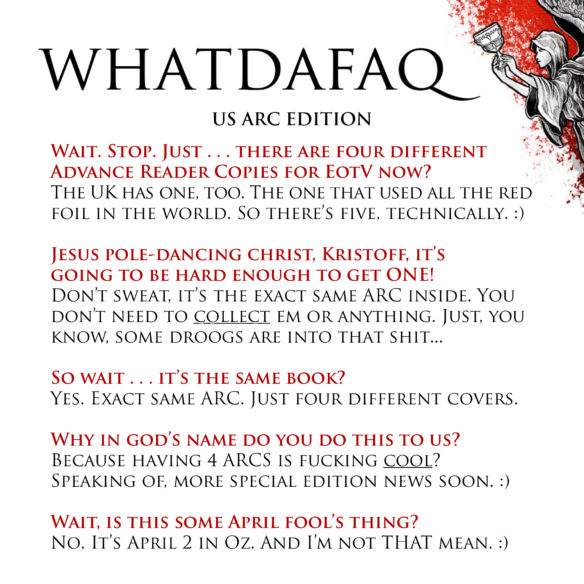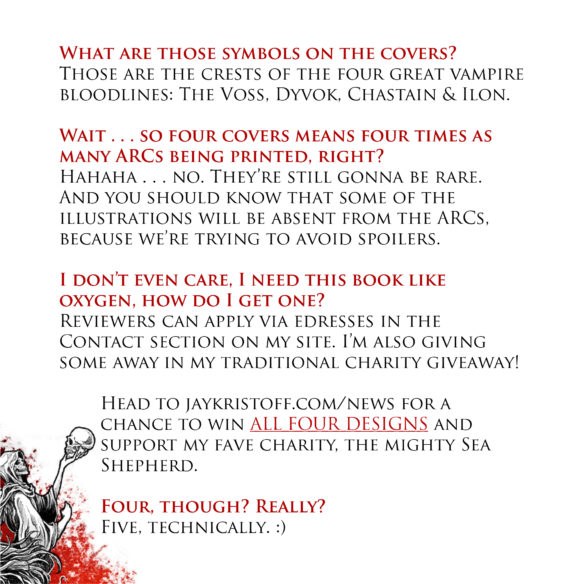By rcade: After Jay Kristoff revealed in a contest announcement Friday that St. Martin’s Press is printing four different covers of the advance review copy (ARC) for his new fantasy novel Empire of the Vampire, some authors are objecting to the commercialization by publishers of something that’s supposed to be about eliciting reviews.
On Twitter, the author Fonda Lee lamented Sunday that “collectible” ARCs are becoming another marketing howitzer to make big authors bigger:
I hear a publisher is offering ARCs of a big name author’s book in multiple collectible editions. Sorry, but that sucks. ARCs are a tool for garnering early industry reviews. They were the one thing every author *used* to be fairly confident their publisher would send out to at least ensure the book was reviewed in trade journals and that librarians and booksellers were aware of it. Then ARCs became part of early marketing. Some authors get shitloads of ARCs stacked in a pyramid at BEA and distributed by the thousands. Many get the bare minimum which these days means an e-ARC available on NetGalley if a reviewer jumps through the right hoops to request it. Weaponizing ARCs as a prestige marketing tool will only exacerbate the author haves vs. have nots, and normalize the sale of ARCs. It’s no surprise, but it stinks.
Some reactions were a little harder to find on social media because people hid Kristoff’s name by using strategically-placed punctuation. Author Kara Jorgensen tweets:
… J*y Kristoff is getting 4 or 5 limited edition ARCs while most people at that same publisher aren’t getting any physical ARCs for their books.
In the ARC giveaway, donations to the Sea Shepherd Conservation Society will earn a matching donation from Kristoff and from one to five chances to win the random drawing.
A fifth edition of the ARC has been produced by the U.K. publisher. The contest announcement anticipated that the multiplicity of ARCs would raise eyebrows. “Jesus pole-dancing Christ, Kristoff it’s going to be hard enough to get one!” it states. “Don’t sweat, it’s the exact same ARC inside. You don’t need to collect ’em or anything.”
Discover more from File 770
Subscribe to get the latest posts to your email.



“Successful authors get more marketing and support”. I fail to understand how that is new, or outrageous.
From what I’ve read in recent posts, one reason this is so controversial is because publishers make a big deal about how print ARCs are not be sold — or even given away. They are not meant for readers. They are not supposed to be collected (even though they are). If you’ve ever gotten an ARC, you’ll see the strong language printed on the cover.
Publishers often refuse to send print ARCs to online reviewers, even established ones, claiming that these reviewers are probably going to sell those ARCs. (Yet they had no problem sending out ARCs to Harriet Klausner, who was long suspected of selling ARCs.) The reviewers I know would never resell ARCs. (Publishers have also accused online reviewers of using ARCs to upload pirated books, and I don’t know any reviewer who would do that,)
But suddenly, a major publisher is openly putting out collectible ARCs so that readers can try to get copies. So reviewers and authors alike are pointing out the hypocrisy. Publishers know readers are going to try to get these or will try to buy them eBay and other sites. (Yes, readers will have to contribute to charity to get a chance to get one, and that’s great. But the charity won’t get anything from the bids that come later.)
Also, the ARC issue is controversial is because publishers used to send print ARCs to bookstores, librarians, BEA, reviewers, etc. to generate publicity (and thus orders) for all authors. Both new and established. This was a vital part of publicity.
Now, most ARCs are available only as electronic ARCs — usually PDFs that are very hard to read. (This means many reviewers and booksellers can’t read them.) This isn’t just because of COVID — this was being done before COVID.
Once an author was established, some of the posts explained that fewer ARCs might be sent out. Now, most authors are lucky to get an electronic ARC — and I think some don’t even get that.
As someone pointed out on twitter for me, once in person cons are a thing, it’s dollars to donuts these arcs are going to wind up on dealer’s tables.
Oh, the whole point of these ARCs is to become the object of a major collectibles rush, which is a complete inversion of what ARCs are intended to be and if what publishers have long used strong language to ensure we knew.
Oh, and if this doesn’t become four different covers on the published book, to ensure collectors scrambling to buy “the complete set,” I’ll eat my hat.
One of the reasons other authors with books coming out this year are unhappy is that we’ve been told pandemic economic stress and publishing difficulties are the main reason the vast majority of us are only getting e-ARCs in 2020 and 2021, and that it’s extraordinary circumstances and just bad luck. When a publisher is putting out four different print versions, that would seem to contradict that message.
Debut authors know their book is a shot at success, and they spend a lot of time worrying about marketing and how to make the most of whatever effort a publisher will put in. I am unsurprised by the reactions and while I can see where someone would revel in the multiplicity of their ARCs, it comes off a bit like smearing oneself with cake while in the middle of a hungry mob.
Yeah this seems ridiculous. As a small time blog reviewer, I do get what I consider to be at this point a pretty high number of ARCs through Netgalley and occasionally through other sources in print. Note that Anne’s comment above isn’t quite correct – most eARCs I get,, from both major and small publishers, are formatted in multiple formats in very readable fashion, although there’s at least one publisher (subterranean press is very guilty of this) who has issues. But I never complain because, it’s a pre-release review copy, which I didn’t pay for, and it’s my job to review it not to complain about formatting for a publisher who often has other more important things to do.
And the key about these ARCs is that they aren’t for sale – that’s made clear full out, but for garnering good press. I feel GUILTY getting them at times because I don’t think i have the press impact I should to get them – for a publisher to make them collector’s items is utterly and completely backwards.
Even worse, by making a big deal of the collector’s item nature of these, it generates more press for this author’s books while other authors’ ARCs are much lower profile and supported. It creates an even worse multi-tier category of ARCs, to go along with what is already a multi-tiered level of promotion that screws authors not lucky enough to either already be high profile or to be favored by their publishers to an insane degree.
The current ARC situation is far from perfect and could use some improvements. Making ARCs collectibles only makes it worse.
Do some authors dislike ARCs being printed in large number because it puts an unfinished version of their book out there forever with errors that got corrected before the first printing?
Whenever I’ve seen ARCs at used bookstores, they had plain covers and flimsy printing like this Stephen King Dreamcatcher ARC. They didn’t look like special editions to hook collectors.
You shouldn’t feel guilty. Publishers wouldn’t give you ARCs if it wasn’t a beneficial arrangement for them. Having reviewers who will increase awareness of a new book is a big deal.
When I worked at a daily newspaper, we were sent books all the time even though less than one in a hundred would be reviewed. You’re actually doing something with the ARCs you get.
Do you suppose this is a pendemic miscue? All those boring zoom meetings, nobody really paying attention, asking questions, thinking through the implications and consequences…no daily face to face presence to mitigate against a choice that sounds like a pretty cool idea to one or two people. Falls through the cracks… Publishers are pretty big, hard to micromanage every department.
It all seems avoidable.
Baen, of course, sell eArcs.
Brown Robin: Maybe that, though I have one other thought. If Kristoff’s sales are important to the publisher’s bottom line, then management might think about putting resources behind him in the same way an army would be sure Goliath got a good meal even if some other warriors got shorted.
Very much this.
If the object is to make money off ARCs, maybe those should be called something else. The ARCs that are clearly aimed at getting advance reviews & publicity are still ARCs. These? These are “Early Access VIP Collectible Hardbacks with Variant Covers”.
Not only is calling these “ARCs” a total misnomer and a bad precedent, I have to say that Kristoff’s post about this certainly gives the impression that he’s a real jerk.
Kristoff has a lot of critics out there. His first fantasy series was based on Asian mythology but felt like he’d done no more research than a few Wikipedia articles. One of his later series (beginning with Nevernight) has been castigated recently because the villains embody the “evil albino” trope and because the story uses Jewish terms in an apparently derogatory manner. Possibly not intended, but definitely dubious.
Pingback: Top 10 Stories for April 2021 | File 770